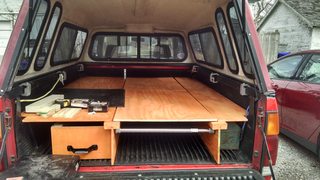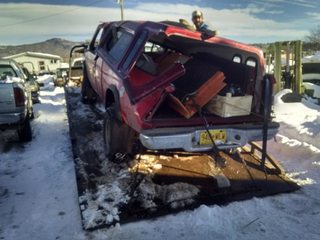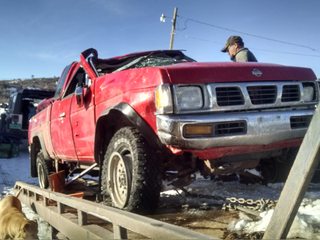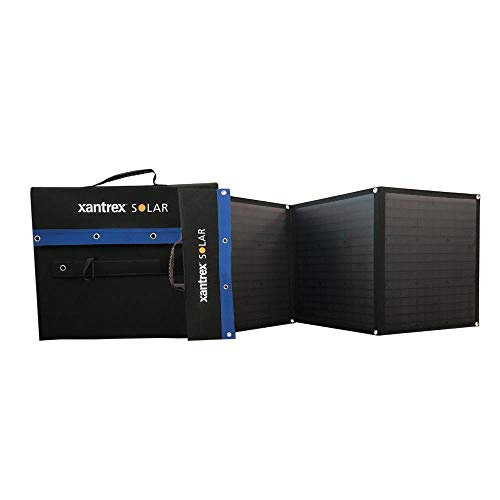highest_vision
Well-known member
I think this is the right spot for this, and I wanted to share my thoughts about my experience, even though they are rather lengthy. I guess this is an essay, but I included pictures so I guess that makes it a graphic novel… No blood, but there is car carnage,

When building a vehicle for short or long term use, it seems we tend to think about ergonomics and safety as they pertain to us while living in the vehicle, but we do not think about these things as they pertain to us while driving. While going down the road. While having an accident. During a wreck, after a wreck, where do things go? How secure is secure? Will relatively benign objects suddenly become deadly? Did I put the butcher knife up? We probably won't think about these things during the incident, or even in the immediate aftermath, but with proper planning we will have the opportunity to not just think about these things, but to pursue the life we enjoy again. That is the goal, and the purpose of this attempt at personal and collective reflection.
I rolled my vehicle a few weeks ago. It was a fairly high speed rollover, 60 or so miles per hour. From my vantage point, it was hard to say exactly what happened other than I was subject to forces I hadn’t previously experienced. I was airborne at one point, managing to go over a barbed wire fence. Almost everything in the cab was ejected except for me (seat belts are amazing!). The fiberglass camper shell, secured with six clamps intended for holding shells on, came off. The clamps bent, the shell was damaged. The driver side bedside collapsed. Given this failure of an important structural component (the bedside), anything connected to that side would have failed. Because my fuel tank is on the passenger side, all my (limited) storage was on the driver side. None of the storage was designed to be upside down. Most cab windows, and a couple shell windows, were broken.

My vehicle was heavily injured (totaled), but I was not nearly so bad. My injuries would have been the same if I was driving a vehicle with nothing in it but me: I had a closed fracture in my neck (but could easily have been very different), some damage to my right shoulder (possible aggravation of old torn rotator cuff), minor lacerations due to glass (no stitches), and minor contusions. None of these injuries were from flying objects, except for glass. The roll started perhaps 30 feet from the road, and ended perhaps 150 feet from the road. My tool box, perhaps 40 pounds, was about 50 feet from where I stopped. Lots of stuff all over.
The living situation I had did not have any real design in it with regards to safety beyond the nature of a pickup bed being separate from the cab. I had a plywood, shelf-type platform to create a sort of basement for storage. This was held in by one bolt, a twist lock shower curtain bar, a sliding door lock bar, and gravity. The tool box, my “filing cabinet” with things like birth certificate, and kitchen items like my two burner were “in the basement.” All my design thoughts related to a frontal collision. I didn’t want my toolbox attacking me! My front grill is plastic. It was unscathed in this accident.

So what? With the recent posting of rollover videos in another thread, I really felt it important to share that it isn’t just what happens to the outside of the vehicle. It isn’t just what happens to the people inside of the vehicle. It isn’t about just the vehicle, it is also about that stuff. With keeping in mind that almost nothing we do can be expected to emerge from an accident unscathed, some things have come to my mind that, in my opinion, can help us emerge less-scathed.
Bulkheads. These are clearly not sexy in the RV world, but for most folks “rolling their own” from a blank canvas van, buying an ex-contractor van with this already installed seems easy. Could they deform in an accident? Maybe, but as a sacrificial component to keep a camp chair outside of my cranium, they will work.
Cab Clutter. If we want to keep things from entering the driver area, we shouldn’t put them there to start with. Because I had a pickup, the jack and the related items mount in the cab. The key word is MOUNT. The jack and its friends stayed put. I also had a DSLR camera in the cab, in its large, padded case. It left the cab. So did maps from the map pocket, a book, and a tape measure. Any of these things could have gouged an eye or caused a head injury (which I didn’t have). Interestingly, the glove box and console remained closed. My metal-framed sunglasses came off, but were fine! Also good eye pokers.
Secure Stuff! We can’t (and shouldn’t) plan for everything, but we can close doors and secure clasps. This is especially critical if you drive around with important documents (I probably shouldn’t do that and am open to options!). My “filing cabinet” was a little red plastic thing. I had two (the other with nothing important), and they were stored right next to each other in “the basement.” The one with important stuff exploded. While it was special to find snow-soaked adoption papers from Calypso, a cat I adopted close to 20 years ago (who has been gone for half of that), it was also stressful that I needed to see if I could locate things like my birth certificate and vehicle title. These things need stronger storage. And things like that tool box? Once loose, something that dense is gonna be bad. Like a fire extinguisher, it needs to be secured. I imagine heavy, dense things like a toolbox can be secured with one or more ratchet straps that are properly mounted. I obviously didn’t do this.
Consider Insurance. This will vary on your financial situation, but if you are like me, and don’t generally have thousands of dollars in the bank, full coverage insurance on your vehicle, even if it is older, can be amazing. I will be getting roughly $3500 for my 25 year old, 234,000 mile pickup, minus $500 deductible. This is close to what I could probably sell it for. This is also way more than I have in my bank. In the five years I have owned the pickup, I have spent about $3000 on insurance, so there alone I am breaking even. I am also getting $5000 in medical. I will not go bankrupt from this accident. My health insurance will cover some. It isn’t even fancy health insurance, it is from the marketplace. I’m not looking to make a political discussion about health insurance. Having it will help. It costs me, right now, about $1600/year. The ambulance ride alone will probably cost that.
Have Friends. This would have been so much harder if I didn't have people to help me. I like to be independent, but sometimes we need Bill Withers. I still need Bill Withers. This website is Bill Withers! Going forward, I personally am going to be better at building and maintaining bridges. In my experience, and unmaintained bridge is just as bad as a burnt one.
That is all! Feedback from others is awesome. I have almost no experience at building living spaces, but am looking for my next one! So don't just listen to me. I don’t want to have another wreck, but if I do, I want to come out on top. Actually, I want to come out inside, buckled. But anyway. Safe travels, and to quote one of my favorite bosses, make good decisions!

When building a vehicle for short or long term use, it seems we tend to think about ergonomics and safety as they pertain to us while living in the vehicle, but we do not think about these things as they pertain to us while driving. While going down the road. While having an accident. During a wreck, after a wreck, where do things go? How secure is secure? Will relatively benign objects suddenly become deadly? Did I put the butcher knife up? We probably won't think about these things during the incident, or even in the immediate aftermath, but with proper planning we will have the opportunity to not just think about these things, but to pursue the life we enjoy again. That is the goal, and the purpose of this attempt at personal and collective reflection.
I rolled my vehicle a few weeks ago. It was a fairly high speed rollover, 60 or so miles per hour. From my vantage point, it was hard to say exactly what happened other than I was subject to forces I hadn’t previously experienced. I was airborne at one point, managing to go over a barbed wire fence. Almost everything in the cab was ejected except for me (seat belts are amazing!). The fiberglass camper shell, secured with six clamps intended for holding shells on, came off. The clamps bent, the shell was damaged. The driver side bedside collapsed. Given this failure of an important structural component (the bedside), anything connected to that side would have failed. Because my fuel tank is on the passenger side, all my (limited) storage was on the driver side. None of the storage was designed to be upside down. Most cab windows, and a couple shell windows, were broken.

My vehicle was heavily injured (totaled), but I was not nearly so bad. My injuries would have been the same if I was driving a vehicle with nothing in it but me: I had a closed fracture in my neck (but could easily have been very different), some damage to my right shoulder (possible aggravation of old torn rotator cuff), minor lacerations due to glass (no stitches), and minor contusions. None of these injuries were from flying objects, except for glass. The roll started perhaps 30 feet from the road, and ended perhaps 150 feet from the road. My tool box, perhaps 40 pounds, was about 50 feet from where I stopped. Lots of stuff all over.
The living situation I had did not have any real design in it with regards to safety beyond the nature of a pickup bed being separate from the cab. I had a plywood, shelf-type platform to create a sort of basement for storage. This was held in by one bolt, a twist lock shower curtain bar, a sliding door lock bar, and gravity. The tool box, my “filing cabinet” with things like birth certificate, and kitchen items like my two burner were “in the basement.” All my design thoughts related to a frontal collision. I didn’t want my toolbox attacking me! My front grill is plastic. It was unscathed in this accident.

So what? With the recent posting of rollover videos in another thread, I really felt it important to share that it isn’t just what happens to the outside of the vehicle. It isn’t just what happens to the people inside of the vehicle. It isn’t about just the vehicle, it is also about that stuff. With keeping in mind that almost nothing we do can be expected to emerge from an accident unscathed, some things have come to my mind that, in my opinion, can help us emerge less-scathed.
Bulkheads. These are clearly not sexy in the RV world, but for most folks “rolling their own” from a blank canvas van, buying an ex-contractor van with this already installed seems easy. Could they deform in an accident? Maybe, but as a sacrificial component to keep a camp chair outside of my cranium, they will work.
Cab Clutter. If we want to keep things from entering the driver area, we shouldn’t put them there to start with. Because I had a pickup, the jack and the related items mount in the cab. The key word is MOUNT. The jack and its friends stayed put. I also had a DSLR camera in the cab, in its large, padded case. It left the cab. So did maps from the map pocket, a book, and a tape measure. Any of these things could have gouged an eye or caused a head injury (which I didn’t have). Interestingly, the glove box and console remained closed. My metal-framed sunglasses came off, but were fine! Also good eye pokers.
Secure Stuff! We can’t (and shouldn’t) plan for everything, but we can close doors and secure clasps. This is especially critical if you drive around with important documents (I probably shouldn’t do that and am open to options!). My “filing cabinet” was a little red plastic thing. I had two (the other with nothing important), and they were stored right next to each other in “the basement.” The one with important stuff exploded. While it was special to find snow-soaked adoption papers from Calypso, a cat I adopted close to 20 years ago (who has been gone for half of that), it was also stressful that I needed to see if I could locate things like my birth certificate and vehicle title. These things need stronger storage. And things like that tool box? Once loose, something that dense is gonna be bad. Like a fire extinguisher, it needs to be secured. I imagine heavy, dense things like a toolbox can be secured with one or more ratchet straps that are properly mounted. I obviously didn’t do this.
Consider Insurance. This will vary on your financial situation, but if you are like me, and don’t generally have thousands of dollars in the bank, full coverage insurance on your vehicle, even if it is older, can be amazing. I will be getting roughly $3500 for my 25 year old, 234,000 mile pickup, minus $500 deductible. This is close to what I could probably sell it for. This is also way more than I have in my bank. In the five years I have owned the pickup, I have spent about $3000 on insurance, so there alone I am breaking even. I am also getting $5000 in medical. I will not go bankrupt from this accident. My health insurance will cover some. It isn’t even fancy health insurance, it is from the marketplace. I’m not looking to make a political discussion about health insurance. Having it will help. It costs me, right now, about $1600/year. The ambulance ride alone will probably cost that.
Have Friends. This would have been so much harder if I didn't have people to help me. I like to be independent, but sometimes we need Bill Withers. I still need Bill Withers. This website is Bill Withers! Going forward, I personally am going to be better at building and maintaining bridges. In my experience, and unmaintained bridge is just as bad as a burnt one.
That is all! Feedback from others is awesome. I have almost no experience at building living spaces, but am looking for my next one! So don't just listen to me. I don’t want to have another wreck, but if I do, I want to come out on top. Actually, I want to come out inside, buckled. But anyway. Safe travels, and to quote one of my favorite bosses, make good decisions!


































































